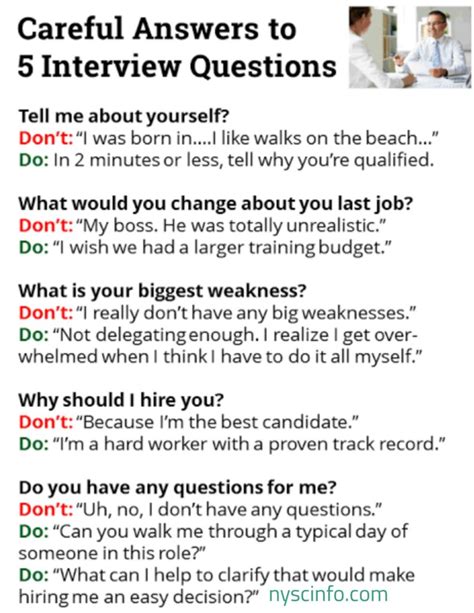Tough Interviews: 12 Questions & Expert Answers

Job interviews can be nerve-wracking experiences, especially when faced with tough interview questions. To help you prepare and succeed, we have compiled a list of 12 common tough interview questions and provided expert answers to help you navigate through them confidently.
1. Tell me about yourself
This question is often used as an icebreaker, but it’s important to answer it strategically. Start with a brief overview of your professional background, focusing on relevant experience and accomplishments. Highlight your strengths and how they align with the job requirements. Avoid personal details that are not relevant to the position.
2. Why do you want to work for our company?
Research the company thoroughly before the interview to understand their values, mission, and culture. Tailor your answer to show your genuine interest in the company and how you can contribute to their success. Mention specific projects, initiatives, or company values that resonate with you.
3. What is your biggest weakness?
When answering this question, be honest but also show self-awareness and growth mindset. Choose a weakness that is not critical to the job you are applying for, and explain how you have been working on improving it. Mention specific steps you have taken or skills you have developed to overcome this weakness.
4. How do you handle conflict or difficult coworkers?
Employers want to ensure you can handle challenging situations professionally. Provide an example of a past conflict or difficult coworker and how you successfully resolved the issue. Highlight your communication and problem-solving skills, as well as your ability to work collaboratively.
5. Describe a time when you failed and how you dealt with it
Everyone experiences failures at some point in their careers. When answering this question, focus on how you turned the failure into a learning experience. Discuss the steps you took to analyze the situation, identify areas for improvement, and implement changes to prevent similar failures in the future.
6. How do you handle high-pressure situations or tight deadlines?
This question assesses your ability to work under stress. Provide an example of a time when you successfully managed a high-pressure situation or met a tight deadline. Discuss the strategies you used to prioritize tasks, stay organized, and maintain focus. Highlight your ability to remain calm and make sound decisions under pressure.
7. Give an example of a time when you had to adapt to change
In today’s fast-paced work environment, adaptability is crucial. Describe a situation where you had to adapt to a significant change, such as a new process or technology implementation. Discuss the steps you took to learn and adjust to the change, highlighting your flexibility and willingness to embrace new challenges.
8. How do you handle feedback or criticism?
Show that you are open to feedback and value continuous improvement. Discuss a specific example where you received constructive criticism and how you responded to it. Emphasize your ability to listen actively, accept feedback gracefully, and take appropriate action to address the feedback.
9. Why did you leave your previous job?
When answering this question, it’s important to be honest but also diplomatic. Focus on the positive aspects of your decision to leave, such as seeking new challenges, career growth, or a better fit for your skills and interests. Avoid talking negatively about your previous employer or colleagues.
10. Describe a time when you demonstrated leadership skills
Leadership skills are highly valued in many roles. Provide an example of a time when you took the lead on a project or initiative. Discuss the challenges you faced, the actions you took to motivate and guide your team, and the successful outcome of your leadership efforts.
11. How do you stay updated with industry trends and developments?
Show your commitment to professional growth and continuous learning. Discuss the resources you use to stay updated, such as industry publications, webinars, conferences, or professional networks. Highlight any certifications or additional training you have pursued to enhance your skills and knowledge.
12. Do you have any questions for us?
Always have a few thoughtful questions prepared for the interviewer. Ask about the company’s future plans, opportunities for professional development, or the team dynamics. This shows your genuine interest in the role and allows you to gather more information to evaluate if the company is the right fit for you.
Conclusion
Preparing for tough interview questions is essential to perform well and stand out from other candidates. By anticipating and practicing your answers to these common tough interview questions, you can approach your interviews with confidence and increase your chances of success.
Frequently Asked Questions
- What are tough interview questions?
- How should I prepare for tough interview questions?
- Can you provide examples of tough interview questions?
- What are employers looking for in tough interview questions?
- How should I answer the “tell me about yourself” question?
- What is the best way to handle criticism in an interview?
- How do I demonstrate leadership skills in an interview?
- Why is it important to research the company before an interview?
- What should I ask the interviewer during the interview?
- How do I handle high-pressure situations in an interview?
Remember, every interview is an opportunity to learn and grow, regardless of the outcome. Use these tough interview questions as a chance to showcase your skills, experiences, and potential contributions to the company. Good luck!
